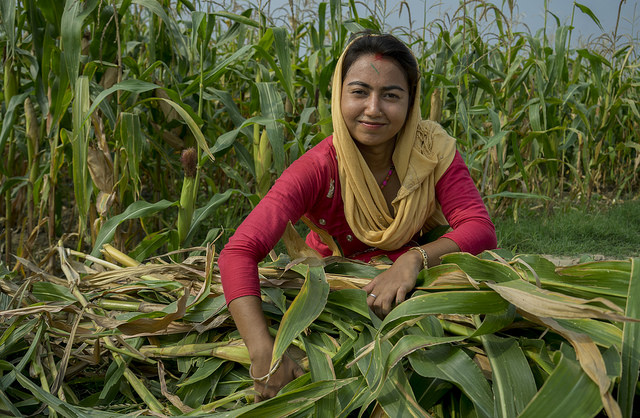
GENNOVATE special issue draws on the voices of women and men in agriculture
by Carolyn Cowan
A diverse and inclusive agricultural framework can be fostered by involving both women and men from different socioeconomic backgrounds and age groups in agricultural innovation interventions. Such an approach can ensure equitable access to resources while stimulating local innovation and development outcomes. Achieving this aim is a complex task. Gender-focused agricultural research for development can inform and streamline the process.
A special issue of the Journal of Gender, Agriculture and Food Security comprises a set of six studies drawing on data collected for the GENNOVATE initiative – a CIMMYT-led, cross-CRP global comparative research initiative, part-funded by the CGIAR Research Program on Maize (MAIZE). The initiative gathered the perspectives and experiences of over 7000 women and men from diverse backgrounds and varied age groups in 137 rural communities across 26 countries during individual interviews, focus groups and community discussions. The special issue reveals a lot about what influences women’s and men’s agency and empowerment to utilize agricultural innovations to improve their livelihoods.

Central to the studies is the concept of gender ‘norms’ which are social rules surrounding women’s and men’s expected roles and behaviors. Such ‘norms’ can influence a person’s ability to access, adopt, adapt and benefit from innovations in agricultural and natural resource management.
The special issue’s opening article details the approach, methods and conceptual framework of the GENNOVATE initiative, and reflects on the context and relevance of gender studies in agricultural development and beyond. The subsequent study emphasizes the importance of addressing social context in applied research and investigates the effectiveness of qualitative comparative methods to understand the strong and fluid influence of gender ‘norms’ on agricultural innovation.
The four further studies utilize data sourced across Africa, Asia and Latin America to address a wide range of issues. Topics include: key characteristics of women and men rural innovators; rural young women’s and men’s occupational aspirations; and how gender ‘norms’ affect women’s and men’s agency and empowerment in terms of social processes and under various village typologies e.g. villages that are ‘transforming’ versus villages that are ‘climbing’ or ‘churning’.
Results indicate that factors related to personality and agency are what most drive capacity to innovate in the study sites. Access to resources is not a prerequisite but an important enabling aspect. Women have great potential for local innovation, but structural inequalities mean that men are often better positioned to access resources and leverage support – as a result when women challenge the status quo, men’s support is important.
Rural young participants predominantly aspire for formal blue and white-collar employment, but many aspirations go unfulfilled due to lack of access to educational pathways to secure such formal employment. In these cases, young people tend to fall back on family agriculture. The researchers discuss implications for agricultural policy and research for development and opportunities for catalyzing uptake of agricultural innovation in the study sites. The study also highlights how youth and gender issues are inextricably linked and cannot be understood in isolation from one another.
Perceptions of agency and empowerment to make decisions and capitalize on agricultural opportunity are rooted in normative expectations that are different for women and men and continuously evolve through life-stages and as institutional or opportunistic contexts change. In a village-context, ‘transforming’ villages exhibit an increasing sense of agency among both women and men, due to an inclusive approach that fuels gender equality and drives agricultural innovation. Villages with such transformative social frameworks present wider benefits, including infrastructure improvements and expanded markets, which can further improve livelihoods.
Read the full articles in the special issue of the Journal of Gender, Agriculture and Food Security, September 2018 Volume 3, Issue 1: here.
The papers draw on data collected as part of the GENNOVATE case studies funded by the CGIAR Research Programs on Maize, Wheat, Grain Legumes, Humid Tropics and Rice, as well as RTB (Roots, Tubers and Bananas), A4NH (Agriculture for Nutrition and Health) and FTA (Forests, Trees and Agroforestry).
Development of research design and field methodology was supported by the CGIAR Gender & Agricultural Research Network, the World Bank, the governments of Mexico and Germany, and the CGIAR Research Programs on Maize and Wheat. Data analysis was supported by the Bill & Melinda Gates Foundation.
